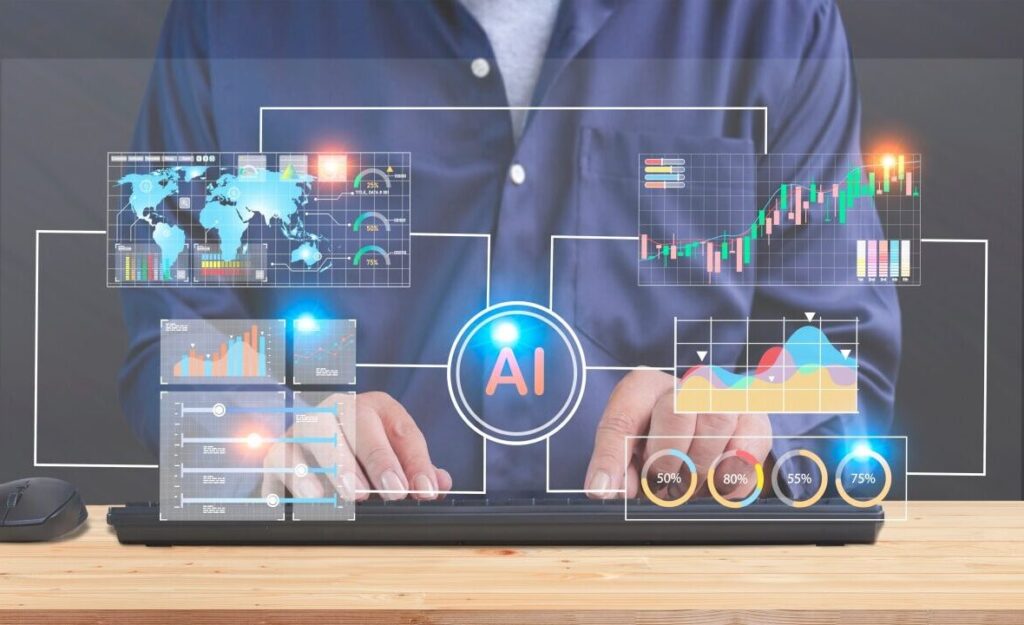The Impact Of AI-Driven Fintech Solutions On Investment Decisions
Modern investment strategies can be obtained more effectively and based on scientific methods with AI-driven fintech solutions. Artificial intelligence technology, the trendiest technology of recent years, continues to lead to revolutionary changes in every field.
The gradual development of machine learning technology has accelerated the access of artificial intelligence solutions and tools to every segment of society.
Content produced with artificial intelligence tools on social media platforms attracts everyone’s attention. One of the areas most affected by artificial intelligence solutions is the fintech field.
Since the fintech field is an area that produces technology for our needs in financial processes, the number of artificial intelligence-supported fintech solutions is increasing in the fintech field, as in many other areas.
Investors manage a much more efficient and practical investment process compared to traditional analysis tools by performing data-oriented analyses thanks to artificial intelligence-supported fintech solutions.
Traditional finance models are disappearing with AI-driven fintech solutions. Thanks to these solutions, investors of all levels can analyze the data and market trends in the desired market very realistically and achieve profitable returns in portfolio management.
What Are AI-Driven Fintech Solutions And How Do They Work?

AI-supported fintech solutions can be defined as solutions where the technological solutions we use in the process of meeting our financial needs are combined with AI technology.
Credit evaluation processes become fairer and more efficient by using AI-driven fintech solutions, and this eliminates many expenses of financial institutions.
For example, in investment processes or financial processes that were previously managed with traditional methods, analyzing large amounts of data and following market trends are only suitable for the skills of professional financiers.
However, thanks to the AI-supported fintech solutions offered by the development of machine learning technology, investors of all levels can analyze large amounts of data with scientific methods in a short time and detect market trends with higher foresight and obtain returns.
Not only for investors, artificial intelligence-supported fintech solutions have begun to be used for meeting individual financial needs and microeconomic management, such as savings programs.
Why AI-Driven Fintech Solutions Are Reshaping Investment Strategies?
Thanks to AI-supported fintech solutions, many benefits have been offered to every participant in investment ecosystems. Millions of investors in different markets can implement strategies faster and with higher accuracy thanks to AI-supported fintech solutions.
Initiatives that prioritize evaluating AI-driven fintech solutions react quickly to changes in the market and can adapt quickly, in addition to the infrastructure. Thanks to artificial intelligence solutions, investors do not have adaptation problems in rapidly changing market conditions.
Moreover, thanks to the artificial intelligence tools in many fintech applications, they can grasp the dynamics of different stock markets, such as fintech and cryptocurrencies, in a shorter time.
With these features, it is reshaping the investment ecosystems of the future. Thanks to AI-supported fintech solutions, even investors with relatively low financial literacy levels can manage portfolios with high profit or return rates in the future.
The Role Of Data Analytics In AI-Driven Fintech Solutions
Data analytics is one of the most effective solutions for AI-supported fintech solutions. Data analytics used to consist of analyzing data recorded analogously by thousands of computers for days in the light of financial experts’ analysis and methods, and it was impossible to get results in a short time.
However, thanks to developing machine learning technology and artificial intelligence tools, even very large amounts of data can be analyzed with scientific methods in a much shorter time.
Artificial intelligence solutions analyze almost all of the past data in a market in a short time, allowing for highly accurate predictions about future trends and tendencies.
In this way, investors manage profitable portfolios by applying scientifically based strategies instead of emotional reactions, regardless of the market they are in.
Data analytics has become a much more widespread area with artificial intelligence as an important area in which both businesses and financial institutions invest in today’s world.
How AI-Driven Fintech Solutions Improve Risk Assessment?
Almost every market today includes some risks due to its dynamics, and investors need to successfully manage their risk assessment processes. Developing strategies that are in line with risk tolerance is of utmost importance.
Risk assessment in the investment world has undergone radical changes with artificial intelligence solutions. In this process, investors aim to increase their returns as much as possible. In the past, risk analysis tools were quite limited. It was difficult to even access data sets in any market.
However, thanks to today’s advanced machine learning algorithms, investors can analyze past data of financial markets in a short time and better determine future trends.
Although economic indicators do not contain clear signals for humans, they become much more comprehensive and clear thanks to AI-supported fintech solutions.
Especially wealthy and high-profile investor profiles gain the ability to detect possible risk elements early thanks to artificial intelligence-supported solutions. In addition, these solutions are also very effective for automatically optimizing the risk-return balance in investment portfolios.
Real-Time Decision Making With AI-Driven Fintech Tools

Thanks to AI-driven fintech solutions, real-time actions can be taken in almost every market. Being able to react instantly to instant changes is of critical importance for investors.
Investors who want to maintain their competitive advantage in the modern world under rapidly changing conditions can make profitable transactions by making determinations about market trends within milliseconds thanks to these solutions.
For example, with a machine learning algorithm, you can simulate how an economic development that will occur around the world will affect the markets. When such a scenario becomes real, it will be more possible for you to determine what the most profitable move is.
Thanks to the technology generally called natural language processing or NLP, artificial intelligence systems can analyze instant news and developments and send real-time notifications to investors via mobile applications.
It seems that this technology will continue to be even more interesting in the future. Mobile applications are becoming increasingly important in today’s digital world. The use of mobile devices is rapidly increasing.
For this reason, the use of mobile applications is becoming widespread in many different sectors. Factors such as the advantages, disadvantages, functionality, user experience, security, and performance offered by mobile applications can be critical for many sectors.
For this reason, studies should be conducted to understand the development, use, and impact of mobile applications.
Future studies may also address issues such as the characteristics of mobile application users, areas of use, frequency of use, user preferences, application download and purchase behaviors, trends in the mobile application market, market size, marketing strategies, and competitive analysis.
Examining mobile applications can help businesses create mobile strategies for the marketing field. It is also important for understanding the problems that may arise during the development and use of mobile applications.
Artificial intelligence technology is advancing rapidly and is being used in many areas. Although it is not yet fully predicted what this technology can do in the future, it is thought that it will become more widespread in our lives.
It is thought that the more integrated businesses are, the more superior they will be in the market.
Benefits Of Using AI-Driven Fintech Solutions For Investors
Artificial intelligence technology provides significant advantages in areas such as personalizing user experience, data analysis, demand forecasting and inventory management for mobile applications.
Thanks to personalized suggestions, users can easily find the products they want and receive services specific to their needs. Data analysis helps businesses reach the right target audience with the right product.
No matter what sector you are in, thanks to AI-powered mobile applications, tools, or solutions in general, you can experience many benefits while managing your investment portfolios. The most critical benefits can be listed as follows:
- Access to customized solutions: Investors can find steps or tips that suit their unique risk tolerance.
- Time and cost flexibility: Thanks to AI-driven fintech solutions, you can allocate much less time and resources compared to traditional analysis methods
- Automation: Thanks to automation, you can constantly follow the market and make simultaneous transactions 24/7
- Being based on data with scientific methods: Instead of emotional reactions, you can make more comprehensive determinations thanks to analysis based on data with scientific methods
Challenges And Limitations Of AI-Driven Fintech Solutions
Although artificial intelligence solutions offer numerous advantages in the fintech field, it should not be forgotten that there are some difficulties for investors.
Moreover, it should be taken into account that there are not only difficulties but also some limitations due to regulations.
AI-driven fintech solutions are also useful in combating fraud for financial institutions. In the future, digital banking processes will be much more transparent and secure. Since algorithms provide security, there will be no doubt.
Although it offers numerous benefits as a new technology with innovative solutions, artificial intelligence technology is still not an area where current regulations are formed in many official countries, and this may cause some legal problems for institutional investors.
In the future, AI-driven fintech solutions will make a difference not only in the field of investment, but also in individuals’ budget management and savings habits with their mobile phones.
For individual investors, we can list the possible difficulties that AI-supported fintech solutions may present as follows:
- Data quality and trust issues: Although AI can analyze large amounts of data, it is known to make mistakes from time to time.
- Algorithmic bias: From time to time, errors in past data can lead to incorrect determinations about future trends
- Need for human supervision: Fully automated 24/7 transactions may cause investors to make wrong transactions in unusual cases.
How AI-Driven Fintech Solutions Influence Retail Vs. Institutional Investing?
With the development of machine learning algorithms, there have been many revolutionary changes in the fintech field, as in every field, and one of them is that the work of individual and institutional investors is quite practical.
Portfolio optimization is also made easier with AI-driven fintech solutions that make risk management strategies practical.
We can list the effects of AI-supported fintech solutions for individual investors, retail, as follows:
- Nowadays, investors from all profiles can access data and analysis that used to be
accessible only to professional investors
- They can access personalized tips thanks to robo consultancy services
We can list the effects of this technology for institutional investors or institutional investing as follows:
- They can perform the big data analysis process faster with less cost
- They can offer the right contributions and strategies by predicting market trends in the diversity of their investment portfolios.
Examples Of Successful AI-Driven Fintech Solutions In Action

Today, the area that individuals or institutions investing in fintech are most interested in and follow with curiosity is AI-supported fintech solutions. In today’s markets, thousands of applications or services offer products in this field for investors.
Thanks to AI-driven fintech solutions, each user can access personalized financial advice. In this way, specialized financial processes and management can be easier. In the future, each investor will be able to meet with their own developed and customized AI solutions.
We can give two examples of the most widely used and recognized by investors in the market. Thanks to Betterment, which was founded in the USA, many individual investors can receive robo-advisory services.
Through this application, investors of all levels can access customized portfolio management strategies.
Another example is Upstart. In this platform, more comprehensive credit assessment reports are prepared with AI-supported fintech solutions, unlike traditional credit score systems.
Future Trends In AI-Driven Fintech Solutions And Investment Decision-Making
Financial institutions are investing in AI-driven fintech solutions in order to provide better customer service. Even today, the fintech field, which is developing and changing every day, will become even more popular in the future with artificial intelligence-supported solutions.
The spread of quantum computing solutions, the development of machine learning, the increase in adoption, and the formation of regulations signal that this technology will become much more popular in the future.
Even though quantum computers are not yet popular enough today, the predictions about this technology are very interesting. This technology, which will be able to analyze huge amounts of data in seconds without any errors in the future, seems to change the entire financial ecosystem.
See you in the next post,
Anil UZUN
